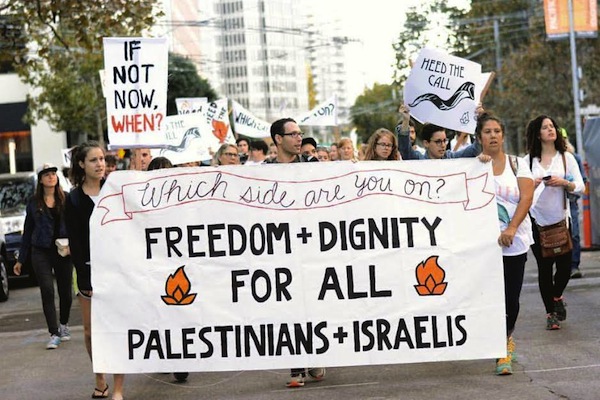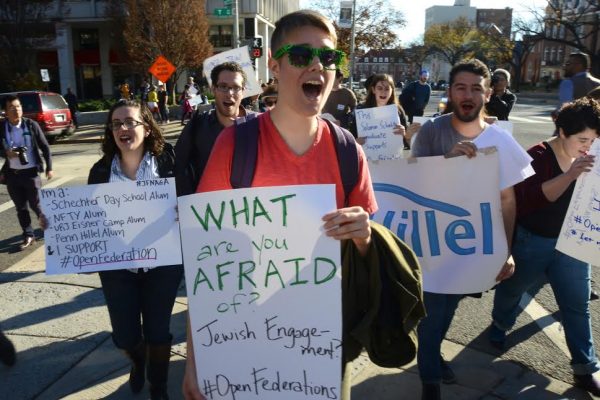In the age of Trump, American Jewish institutions need to include the majority of U.S. Jews who rejected his divisive rhetoric and give a platform to dissenting voices — whether they are speaking out against U.S. or Israeli government policy.
By Ben Pakman

The Jewish American people are entering what promises to be a tumultuous time under the Trump presidency. Our morals and resolve are being tested and, fairly or not, the rest of the world is observing us under a microscope.
The most prominent American Jews — Trump cohorts like David Friedman (recently appointed as U.S. ambassador to Israel), Sheldon Adelson and Jared Kushner — hardly represent the best of our community. Unfortunately, the same goes for the institutions that aim to serve and claim to represent the American Jewish community, such as the campus organization Hillel International.
It was this troubling reality that led me to stand with Open Hillel the day before Donald Trump’s inauguration, in order to protest Hillel International’s partnership with Mosaic United — a group co-founded and partially funded by Israel’s Ministry of Diaspora Affairs, led by far-right minister Naftali Bennett.
Mosaic United’s programming, which explicitly aims to combat “critical discourse” on Israel, will only put up blinders to the problems with which our domestic and global Jewish community is grappling, such as the military occupation of the West Bank, the siege on Gaza and institutional support for Trump’s oppressive rhetoric and policies.
It was simultaneously empowering and dismaying to be surrounded at the protest by so many students who share the experience of being silenced or alienated by Jewish institutions. Our institutions frequently marginalize liberal Zionist, non-Zionist and anti-Zionist Jewish voices because of their donors’ politics.
One can expect Hillel’s partnership with Mosaic United to introduce a whole new degree of influence, further entrenching the divisions in our community responsible for our alienation and ensuring the kind of censorship that pushes critical youngsters like myself out of the tent.

Among the most devastating examples of this was when Eric Fingerhut, CEO of Hillel International, refused to attend the 2015 J Street National Conference being held a 10-minute walk from his office — even though over 1,000 students from all over North America were present.
This behavior occurs at all levels of the Hillel institutional ladder. Students are encouraged to avoid forming a J Street U chapter in favor of participating in their school’s supposedly apolitical Students for Israel group. It’s seen, perhaps, as a slippery slope towards allowing students to be exposed to non-Zionist voices (Jewish or non-Jewish).
Mosaic United seeks to serve — or to create and foster — a population of Jewish students unaware of or unwilling to engage in the self-criticism we need today. It plays to our lowest instincts of fear, uniformity and insensitivity. Such tactics of exclusion and division put Mosaic and Naftali Bennett in the same camp as another political force we are dealing with today — Donald Trump.
We are in dire need of the very self-criticism that Hillel International’s standards of partnership strips from our Jewish communities. When Hillel brings onboard big money donors and partners such as Mosaic United, it inevitably lets the values of the donor organizations become the values of Hillel.
Jewish students have to fight tooth and nail simply to be given a platform on which to discuss the progressive values of the 71 percent of American Jewry who did not vote for the divisiveness and xenophobia espoused by Trump. On the other hand, representatives of organizations more aligned with Trumpian values are often invited by Jewish groups and institutions to peddle their agenda to students.
I recently had the opportunity to speak with a Hillel International staffer in Washington D.C. who lamented that Hillel has neglected to engage with recent progressive movements on campus such as Black Lives Matter — even going so far as to actively shut down conversations about racial justice. As a result, we now aren’t even being offered a seat at the table to discuss these issues.
The Trump presidency is a chance for the Jewish community to stand up for our values and show the world what our 71 percent believes in: equality, freedom of speech and pluralistic community engagement, both religious and political. We can’t let the most powerful and least moral in our community dictate its values for the next four years.
And that’s why students and community members are telling Hillel International that the status quo is unacceptable. The time has come to embrace the full diversity of the Jewish community and create a truly positive future for ourselves and the world at large.
Ben Pakman is a New York City native and an undergraduate student at Hunter College.

